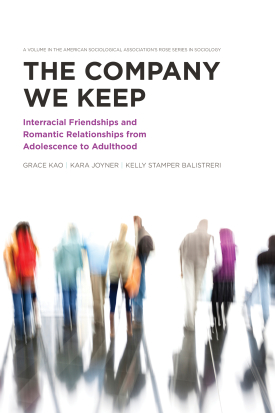
The Company We Keep
About This Book
A Volume in the American Sociological Association’s Rose Series in Sociology
“In this groundbreaking study, the authors explore the extent of interracial friendships and romantic relationships for young people from their early teens through their late twenties. Across the racial and ethnic groups of whites, blacks, Hispanics, and Asians, the authors find complex patterns of racial boundary maintenance and crossing. The complexity of race in twenty-first century America is evident in this clearly written and rigorously researched book. The main finding that race still keeps so many young people apart is tempered with the hopeful finding that kids who attend diverse schools are much more likely to have close friendships and romantic relationships that cross these barriers. The Company We Keep has so much to teach both experts and students about race in America.”
—MARY C. WATERS, John Loeb Professor of Sociology, Harvard University
“This landmark study revises theories of changing ethno-racial boundaries over the life course by examining romantic pairings at two pivotal life course periods and demonstrating unequivocally that intergroup contact and romantic relationships during adolescence carry over to adult relationships. Grace Kao, Kara Joyner, and Kelly Stamper Balistreri clarify the national project of integration by documenting which groups redraw which color lines and under what circumstances. The authors deftly synthesize a vast empirical literature, supplement research gaps with original analyses, and render a complex story about shifting intergroup relations eminently accessible to a broad audience. The Company We Keep will be the touchstone for understanding social integration, race relations, and partnering behavior against the backdrop of increasing population diversification.”
—MARTA TIENDA, Maurice P. During ’22 Professor of Demographic Studies and Professor of Sociology and Public Affairs, Princeton University
“A pathbreaking longitudinal study of interracial friendships and romantic relationships, The Company We Keep confirms the centrality and continuing significance of race in shaping intergroup relations among youth. By centering intersectionality at the core of the empirical analyses, the authors reveal the intricate interactions of race, gender, and class in forming interracial friendship and romantic ties from adolescence to young adulthood. Moreover, the authors document the relative fluidity and permeability of the American color line as young adults simultaneously transgress and transform the multiplicity of racial boundaries. In tracing the positive impacts of contact with other races in adolescence on the likelihood of interracial ties and romantic partners in adulthood, the book also points to one specific pathway toward the future of a more racially integrated American society. The Company We Keep is a must-read for scholars of race and ethnicity, immigration, and intergroup contact and relations.”
—VAN C. TRAN, Associate Professor of Sociology and Deputy Director, Center for Urban Research at the Graduate Center, CUNY
With hate crimes on the rise and social movements like Black Lives Matter bringing increased attention to the issue of police brutality, the American public continues to be divided by issues of race. How do adolescents and young adults form friendships and romantic relationships that bridge the racial divide? In The Company We Keep, sociologists Grace Kao, Kara Joyner, and Kelly Stamper Balistreri examine how race, gender, socioeconomic status, and other factors affect the formation of interracial friendships and romantic relationships among youth. They highlight two factors that increase the likelihood of interracial romantic relationships in young adulthood: attending a diverse school and having an interracial friendship or romance in adolescence.
While research on interracial social ties has often focused on whites and blacks, Hispanics are the largest minority group and Asian Americans are the fastest growing racial group in the United States. The Company We Keep examines friendships and romantic relationships among blacks, whites, Hispanics, and Asian Americans to better understand the full spectrum of contemporary race relations. Using data from the National Longitudinal Study of Adolescent to Adult Health, the authors explore the social ties of more than 15,000 individuals from their first survey responses as middle and high school students in the mid-1990s through young adulthood nearly fifteen years later. They find that while approval for interracial marriages has increased and is nearly universal among young people, interracial friendships and romantic relationships remain relatively rare, especially for whites and blacks. Black women are particularly disadvantaged in forming interracial romantic relationships, while Asian men are disadvantaged in the formation of any romantic relationships, both as adolescents and as young adults. They also find that people in same-sex romantic relationships are more likely to have partners from a different racial group than are people in different-sex relationships. The authors pay close attention to how the formation of interracial friendships and romantic relationships depends on opportunities for interracial contact. They find that the number of students choosing different race friends and romantic partners is greater in schools that are more racially diverse, indicating that school segregation has a profound impact on young people’s social ties.
Kao, Joyner, and Balistreri analyze the ways school diversity and adolescent interracial contact intersect to lay the groundwork for interracial relationships in young adulthood. The Company We Keep provides compelling insights and hope for the future of living and loving across racial divides.
GRACE KAO is IBM Professor of Sociology at Yale University.
KARA JOYNER is professor of sociology at Bowling Green State University.
KELLY STAMPER BALISTRERI is associate professor of sociology at Bowling Green State University.
